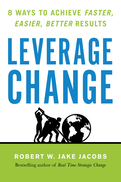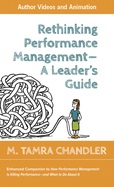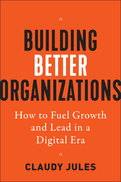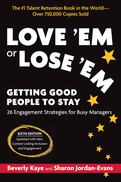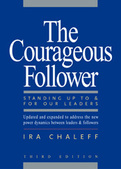Search Results: "how to be an inclusive leader"
Results 67-72 of 663
Leverage Change
2021
Frustrated that change efforts you're leading take too long, are too difficult, or are too often ineffective? Discover eight powerful ways to make any change work faster, easier, and better—whether done by C-suite leaders or frontline workers.
Organizations suffer from change fatigue. People are impatient and exhausted. They feel like too many initiatives are imposed from above or outside. They don't have time for more change and often don't even see the point in it. Wouldn't it be great if there were a systematic way to achieve your desired results in less time with fewer problems and more success? There is. It's called Leverage Change.
These problems and more are resolved by what change expert Robert “Jake” Jacobs calls Levers: smart, strategic actions that create huge leverage and impact. Whether you have an existing change effort that could be turbocharged or you're launching one that's new, the Levers can help. Apply a Lever—even without a formal program—and your organization will experience positive changes. These powerful Levers, which can be used alone or in any combination that works for you, are straightforward and easy to apply:
• Pay Attention to Continuity • Think and Act As If the Future Were Now! • Design It Yourself • Create a Common Database • Start with Impact, Follow the Energy • Develop a Future People Want to Call Their Own • Find Opportunities for People to Make a Meaningful Difference • Make Change-Work Part of Daily-Work
Drawing on thirty-five years of experience, Jacobs includes dozens of stories of the Levers in action with all kinds of organizations, teams, and individuals. He also provides specific directions on how you can apply them to your change work. Use the Levers, and improve your change work more than you ever imagined possible.
Organizations suffer from change fatigue. People are impatient and exhausted. They feel like too many initiatives are imposed from above or outside. They don't have time for more change and often don't even see the point in it. Wouldn't it be great if there were a systematic way to achieve your desired results in less time with fewer problems and more success? There is. It's called Leverage Change.
These problems and more are resolved by what change expert Robert “Jake” Jacobs calls Levers: smart, strategic actions that create huge leverage and impact. Whether you have an existing change effort that could be turbocharged or you're launching one that's new, the Levers can help. Apply a Lever—even without a formal program—and your organization will experience positive changes. These powerful Levers, which can be used alone or in any combination that works for you, are straightforward and easy to apply:
• Pay Attention to Continuity • Think and Act As If the Future Were Now! • Design It Yourself • Create a Common Database • Start with Impact, Follow the Energy • Develop a Future People Want to Call Their Own • Find Opportunities for People to Make a Meaningful Difference • Make Change-Work Part of Daily-Work
Drawing on thirty-five years of experience, Jacobs includes dozens of stories of the Levers in action with all kinds of organizations, teams, and individuals. He also provides specific directions on how you can apply them to your change work. Use the Levers, and improve your change work more than you ever imagined possible.
The video enhanced executive edition of How Performance Management is Killing Performance – and What to Do About It was created with the busy leader in mind. Offering targeted information and insight, and with over 26 minutes of videos and animations throughout, Rethinking Performance Management – A Leader's Guide has been adapted from the original edition to focus on only the points that you, as a leader of an organization, need to know. This means it's much shorter than the original with more of a focus on the big picture theory and less on the step-by-step.
Most people associate performance management with the annual review, which is universally dreaded by employees, management, and HR professionals alike. In this short guide, author Tamra Chandler lays out the key points of creating a performance management process that is not only tailored to your organization's needs and goals, but that employees will actually embrace. Each of the six condensed chapters include short animations or video featuring Tamra herself to sum up the major takeaways for leaders.
For those of us who need to be on the cutting edge of this emerging subject, but don't have as much time as we'd like, Rethinking Performance Management – A Leader's Guide offers the perfect framework to provide insight to the benefits of evolving performance management systems, a process which must be led, championed by the leaders in the organization.
Most people associate performance management with the annual review, which is universally dreaded by employees, management, and HR professionals alike. In this short guide, author Tamra Chandler lays out the key points of creating a performance management process that is not only tailored to your organization's needs and goals, but that employees will actually embrace. Each of the six condensed chapters include short animations or video featuring Tamra herself to sum up the major takeaways for leaders.
For those of us who need to be on the cutting edge of this emerging subject, but don't have as much time as we'd like, Rethinking Performance Management – A Leader's Guide offers the perfect framework to provide insight to the benefits of evolving performance management systems, a process which must be led, championed by the leaders in the organization.
This essential playbook shows how companies can scale success by coupling digital strategies with an investment in the health of their organizations and the people within.
To scale and grow, a company must get the organizational elements right. That begins with having the right strategy, the right leadership to drive it, and the right talent, culture, and organizational design to realize a company's potential. This is especially true in the AI era, where a company's most valuable assets are its people.
To begin with, leaders must rethink their value creation strategies. To hone their organizational edge, leaders must prioritize their organization's health in seven vital areas: strategic direction, culture, leadership, talent, organizational design, EID (equity, inclusion, and diversity), and well-being. No matter what type or size of business, those essential conditions must be leveraged for increased value and growth. Put simply: organizational matters matter. To hone their digital edge, leaders must understand AI, as advances in technology allow leaders to build organizations that can compete and win in the future. Finally, an investor mindset will enable leaders to invest wisely in the technology (and leverage that tech) that sets their organizations apart.
To scale and grow, a company must get the organizational elements right. That begins with having the right strategy, the right leadership to drive it, and the right talent, culture, and organizational design to realize a company's potential. This is especially true in the AI era, where a company's most valuable assets are its people.
To begin with, leaders must rethink their value creation strategies. To hone their organizational edge, leaders must prioritize their organization's health in seven vital areas: strategic direction, culture, leadership, talent, organizational design, EID (equity, inclusion, and diversity), and well-being. No matter what type or size of business, those essential conditions must be leveraged for increased value and growth. Put simply: organizational matters matter. To hone their digital edge, leaders must understand AI, as advances in technology allow leaders to build organizations that can compete and win in the future. Finally, an investor mindset will enable leaders to invest wisely in the technology (and leverage that tech) that sets their organizations apart.
This sixth edition of the number one bestselling employee retention book in the world (over 800,000 copies sold) puts a new emphasis on diversity and inclusion but keeps the same appealing format: twenty-six simple strategies from A to Z.
Despite booms and busts, technology advances, talent wars, layoffs, and even a global pandemic, people want what they've always wanted. Employees want—and now expect—meaningful work, supportive bosses, regular recognition, and a chance to learn and grow. And managers want their amazing people to stay—for at least a little while longer. For two decades, this Wall Street Journal bestseller—over 800,000 sold—has offered twenty-six simple strategies, from A to Z, that managers can use to address their employees' real concerns and keep them engaged.
The authors have gone over every word of the previous edition, revising, updating, and streamlining. This edition includes a timely focus on diversity and inclusion in every chapter. For example, chapter 6 focuses on family. Different cultures view family responsibilities differently, so the authors address how to take that into consideration when a treasured employee asks for extended leave to care for a grandparent. And a new section called “Conversations That Count” offers discussion questions for sparking deeper conversation around the topics in the book.
This new edition will ensure that Love 'Em or Lose 'Em will continue to help managers all over the world create a supportive workplace culture so they can fight burnout and keep the people they can least afford to lose.
Despite booms and busts, technology advances, talent wars, layoffs, and even a global pandemic, people want what they've always wanted. Employees want—and now expect—meaningful work, supportive bosses, regular recognition, and a chance to learn and grow. And managers want their amazing people to stay—for at least a little while longer. For two decades, this Wall Street Journal bestseller—over 800,000 sold—has offered twenty-six simple strategies, from A to Z, that managers can use to address their employees' real concerns and keep them engaged.
The authors have gone over every word of the previous edition, revising, updating, and streamlining. This edition includes a timely focus on diversity and inclusion in every chapter. For example, chapter 6 focuses on family. Different cultures view family responsibilities differently, so the authors address how to take that into consideration when a treasured employee asks for extended leave to care for a grandparent. And a new section called “Conversations That Count” offers discussion questions for sparking deeper conversation around the topics in the book.
This new edition will ensure that Love 'Em or Lose 'Em will continue to help managers all over the world create a supportive workplace culture so they can fight burnout and keep the people they can least afford to lose.
An instant New York Times bestseller!
Do you want the key to driving equity and skyrocketing profits? It's simple: hand over control to your workers.
Discover 9 strategies to create better, healthier workplaces, grounded in evidence-based research.
This revolutionary guide aims to revolutionize the workplace for justice, equity, and profitability by handing the reins over to the real drivers of success: the workers.
Based on research from over 1,200 companies, including WalMart, Google, and JPMorgan Chase, this book follows real-world cases from companies where employees evolved from silent contributors to masterminds steering corporate strategies. These cases are the vanguard of a vibrant era in which workers will be the architects of their destinies, shaping not just their own careers but the entire trajectories of their organizations. Her work has quantified the financial impact investing in people can have on an organization- the first reliable calculation in the literature of talent retention.
From this research, 9 key strategies emerged:
•Centering employee voices
•Mutualistic working relationships
•Intersectional inclusion strategies
•Reimaging employee benefits
•Frontline leader driven strategies
•Hire STARS
•Develop deep talent benches
•Human capital reporting as a competitive strategy
•Distributed leadership
This book goes deeper to show how these strategies are working in the real-world today. When workers have stakes, everyone scores: businesses surge, and teams ride a high they've never felt before. This is a win-win proposition: both management and labor win when you put people first.
Do you want the key to driving equity and skyrocketing profits? It's simple: hand over control to your workers.
Discover 9 strategies to create better, healthier workplaces, grounded in evidence-based research.
This revolutionary guide aims to revolutionize the workplace for justice, equity, and profitability by handing the reins over to the real drivers of success: the workers.
Based on research from over 1,200 companies, including WalMart, Google, and JPMorgan Chase, this book follows real-world cases from companies where employees evolved from silent contributors to masterminds steering corporate strategies. These cases are the vanguard of a vibrant era in which workers will be the architects of their destinies, shaping not just their own careers but the entire trajectories of their organizations. Her work has quantified the financial impact investing in people can have on an organization- the first reliable calculation in the literature of talent retention.
From this research, 9 key strategies emerged:
•Centering employee voices
•Mutualistic working relationships
•Intersectional inclusion strategies
•Reimaging employee benefits
•Frontline leader driven strategies
•Hire STARS
•Develop deep talent benches
•Human capital reporting as a competitive strategy
•Distributed leadership
This book goes deeper to show how these strategies are working in the real-world today. When workers have stakes, everyone scores: businesses surge, and teams ride a high they've never felt before. This is a win-win proposition: both management and labor win when you put people first.
Many significant failures—from FEMA's response to Hurricane Katrina to the recent economic collapse—could have been prevented or mitigated if those lower in the hierarchy were successful at communicating to leaders the risks they saw in the system. Ira Chaleff's Courageous Follower model has facilitated healthy upward information flow in organizations for over 15 years. The Harvard Business Review called Chaleff a pioneer in the emerging field of followership—this new edition shares his latest thinking on an increasingly vital topic.
The updated third edition includes a new chapter, “The Courage to Speak to the Hierarchy.” Much of Chaleff's model is based on followers having access to the leader. But today, followers can be handed questionable policies and orders that come from many levels above them—even from the other side of the world. Chaleff explores how they can respond effectively, particularly using the power now available through advances in communications technology.
Everyone is a follower at least some of the time. Chaleff strips away the passive connotations of that role and provides tools to help followers effectively partner with leaders. He provides rich guidance to leaders and boards on fostering a climate that encourages courageous followership. The results include increased support for leaders, reduced cynicism and organizations saved from serious missteps.
The updated third edition includes a new chapter, “The Courage to Speak to the Hierarchy.” Much of Chaleff's model is based on followers having access to the leader. But today, followers can be handed questionable policies and orders that come from many levels above them—even from the other side of the world. Chaleff explores how they can respond effectively, particularly using the power now available through advances in communications technology.
Everyone is a follower at least some of the time. Chaleff strips away the passive connotations of that role and provides tools to help followers effectively partner with leaders. He provides rich guidance to leaders and boards on fostering a climate that encourages courageous followership. The results include increased support for leaders, reduced cynicism and organizations saved from serious missteps.


